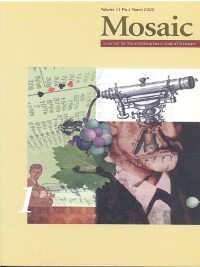Issue 33.1
Overview

General Issue
Published: March 2000
View the issue introduction or see the issue summary and contents below.
10 essays, totalling 192 pages
$15.00 CAD
“In this, its first issue of the millennium and with a new Editor in place, Mosaic brings together ten essays that are, in varying ways, informed by contemporary French theory and its critical notion of différance, or of what Jean-François Lyotard calls le différend: a distress in the sign/signifying system wherein something that cannot be represented, something ‘sublime,’ shows itself only in retreat/retrait,” writes Dawne McCance in her introduction of this, her first issue as Editor of Mosaic. The issue contains essays concerned with Jacques Lacan and the father, Oscar Wilde and verbal musicality, Ralph Waldo Emerson and the sublime, Roland Barthes and literary criticism, and Friedrich Nietzsche and the ghost of philosophy.
Lacan and Claudel’s Crusts: The Thematic of the FatherMohammad Kowsar Jacques Lacan’s encounter with Paul Claudel’s play Crusts foregrounds the typical traumatization of the psychoanalytic subject in the face of paternal prohibitions. Lacan’s reading of Claudel shows that the subject’s privation is most extreme when the father deliberately abjures the responsible wielding of his symbolic power. | |
The “Strange Music” of Salome: Oscar Wilde’s Rhetoric of Verbal MusicalityDavid Wayne Thomas Walter Pater once proposed that all art aspires to the condition of music. Oscar Wilde’s drama Salome harbors that aspiration, but in a deliberately equivocal fashion, casting verbal music as a seductive but ultimately futile venture. Wilde dramatizes this divided standpoint to suggest, in literary form, how interpretive subjectivity is conditioned by a representational mandate that can neither be fulfilled nor denied. | |
Emerson’s Nature, Paralogy, and the Physics of the SublimeEric Wilson While Emerson has generally been read as an exemplar of a transcendental sublime, the electromagnetism of Faraday inspired him to embrace an alternative sublime vision wherein matter is a field of electrical force, not part of a spiritual whole. Emerson’s Nature struggles between these two versions of the sublime. Though the essay is about (in content) the harmony of the spirit, it is (in form) a field of paralogical force. | |
Sarah and Sappho: Lesbian Reference in The French Lieutenant’s WomanDavid W. Landrum This essay examines the ambiguity that attends to lesbian sexuality in John Fowles’s The French Lieutenant’s Woman. While the narrator of the novel struggles to deny the lesbianism of Sarah Woodruff—the unbounded sexuality that links Sarah to Sappho of Lesbos—the novel’s postmodern textual and visual elements undercut the narrator’s ideological stance. | |
Gide, Nietzsche, and the Ghost of PhilosophyDidier Maleuvre Gide’s novels can be understood not only as bearing the influence of philosophy, but also as supporting a critical and thematic stance toward it. The influence comes into sharp relief in Gide’s intellectual connection and debt to Nietzsche. How Gide negotiates this debt, while staking his personal claim to the philosophical voice, is the subject of this essay. | |
Roland Barthes and the Syllogisms of Literary CriticismNicholas O. Pagan This essay sees literary criticism as participating in a dialectic between is and ought, between science and art. Using a neo-Aristotelian version of rhetoric, the essay argues that even a critic like Roland Barthes, whose work seems to be informed by a predominently Nietzschean aesthetic, cannot escape the exigencies of logical argumentation. | |
Towers and Mirrors: Aspects of Space in La Princesse de ClèvesKeren M. Smith Mme de La Fayette’s La Princesse de Clèves creates an imaginative space at once lofty and confining where order is ensured through the exclusion of what threatens. The novel’s imposition of form on chaos is concretized in the architecture of Versailles as it is in Lacan’s story of the fortress: each maps the subject’s problematic desire for mastery. | |
Live from Golgotha: Gore Vidal and the Problem of Satiric ReinscriptionDon Fletcher and Kate Feros Queer theorizing about the constructed nature of sexuality and post-structuralist theorizing about the discursive nature of history emphasize the manner in which satire reinscribes as it destabilizes. This essay explores these themes focussing specifically on Gore Vidal’s critique in Live from Golgotha of Christianity’s claims to absolute truth and its attitudes toward sexuality. | |
Taking Chances: Speculation and Games of Detection in Dashiell Hammett’s Red HarvestBrian Cooper and Margueritte Murphy This essay examines affinities between strategies of detection in Dashiell Hammett’s Red Harvest and contemporary game theoretic analyses in economics. Both illuminate a modernist impulse to domesticate irrationality by interpreting its irruptions (criminal acts and financial crises) as ultimately explicable strategic behavior. | |
The Game of Late Capitalism: Gambling and Ideology in The Music of ChanceEyal Dotan Examining Paul Auster’s The Music of Chance alongside Jean Baudrillard’s theory of chance and seduction, this essay suggests that rapid growth of the gaming industry is a symptom of late capitalism. The co-dependence of capitalism and its preferred game is seen here as a confrontation between two antagonistic orders of satisfaction and exchange. |